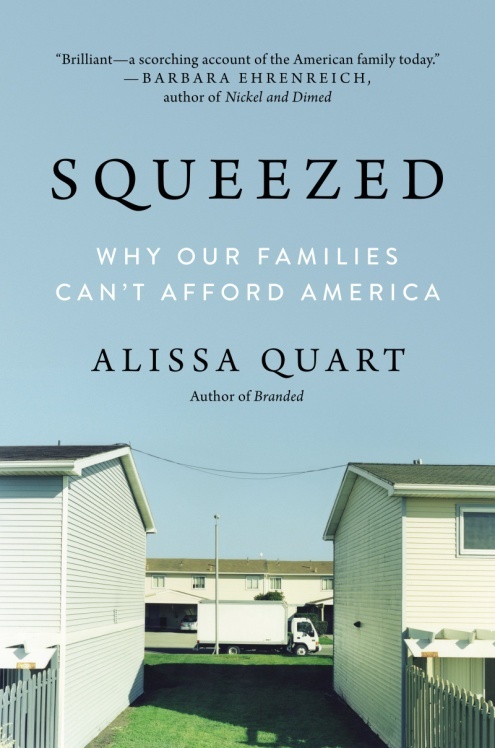(单词翻译:单击)
听力文本
Young Americans Are Less Wealthy Than Their Parents
The cost of living in the United States is going up, notes writer Alissa Quart. As reported in the New York Post, Quart points to "the costs of housing, education, health care and child care in particular."
At the same time, a new study found that half of Americans born in the 1980s are falling behind their parents economically. The study is a project of researchers at Stanford University, Harvard University, and the University of California, Berkeley. Their report is called "The Fading American Dream."
Together, these findings show that many younger adults are experiencing "downward mobility." In other words, they are not doing as well, either socially or economically, as their parents were at the same age.
Will things always get better?
The idea of downward mobility is especially troubling for Americans, writes Robert Samuelson in The Washington Post. He says most U.S. citizens believe that, over time, the amount of money they earn will rise and life will get easier.
And for some, that belief has come true.
In the "Fading American Dream" study, researchers found that 90 percent of Americans born in the 1940s grew up to earn more than their parents. That percentage is so high, say the researchers, partly because of historical events. In the 1930s, the U.S. economy was in a severe depression, and most people's earnings went down. But in the 1950s, the economy expanded, and most people's incomes went up. As a result, almost all Americans born in the 1940s experienced upward mobility.
But among members of this generation, only about 60 percent of their children earned more money than they did. And only 50 percent of children born in the following 10 years were earning more than their parents at the same age.
In other words, Americans' ease of living is going down. In technical terms, the economists write, "Absolute mobility has fallen sharply" over the past 50 years.

The middle class
Alissa Quart wrote a book about the financial difficulties of everyday Americans. It is called Squeezed: Why Our Families Can't Afford America.
In her book, Quart tells about teachers who are struggling to pay for housing, child care and other regular costs. One high school teacher said he drives for ride sharing service Uber at night to earn more money. He corrects students' papers between riders.
Another man, a college professor, only earns enough to pay for simple food, such as pasta and potatoes, for his children. A different college professor turned to government assistance to feed her child and pay for a doctor.
Quart says even lawyers increasingly cannot earn an income that enables them to meet their needs. The problem of decreasing incomes in their field is made worse by debt they may have from law school.
What caused these problems?
Quart and the economists who studied these issues say many things have led to lower incomes and downward mobility.
The economic recession of 2007 to 2009 is partly to blame, they say.
Modern technology also plays a part. Quart says robots threaten to reduce the earnings of health care workers, truckers, reporters, and people who work at supermarkets, drug stores and tax preparation services.
In The Washington Post, Robert Samuelson noted that poor schools, a weak housing industry and too many government rules also are to blame.
With all these things – and more – partly responsible, what is the solution? These experts say the answer is complex. But all point to one issue that needs to be examined: economic inequality. Quartz writes that while America is one of the richest countries in the world, it also has one of the biggest divides between the wealthy and the poor.
The researchers in the "Fading American Dream" study make a similar observation. They say raising GDP — the gross domestic product – will not significantly improve the economic situation of most Americans. A higher GDP may help only those who are already doing well.
Instead, the economists say, the United States could try to repeat something Americans born in the 1940s experienced. As those children grew up, they almost all benefited from a better economy.
I'm Jonathan Evans.
重点解析
重点讲解:
1. in particular 尤其;特别;
I think a lot of people, women in particular, steer clear of these sensitive issues.
我认为很多人,特别是女性,都会回避这些敏感问题。
2. fall behind 落后;跟不上;
If you don't come to class regularly, you will fall behind in your studies.
如果你经常不来上课,学习成绩就会落在别人后面。
3. come true (梦想、愿望或预言)成真,成为现实;
I believe in myself, I'm sure I can make my dream come true.
我相信我自己,我相信我一定可以实现我的梦想。
4. threaten to do sth. (坏事)可能发生,将要发生;
Both actual price rises and fears of future inflation threaten to put central bankers around the world in a tough spot.
实际价格上涨和对未来通胀的担忧都可能会令全球各国央行处于艰难境地。
参考译文
美国年轻人没有父母富有
作家阿丽沙·夸特指出,美国的生活成本日益增加。据《纽约邮报》报道,阿丽沙特别指出了“住房、教育、医保和儿童保育的费用”。
同时,一项新研究发现,有一半的美国80后在经济上落后于父母。这项研究是斯坦福大学、哈佛大学和加州大学伯克利分校研究人员的一个研究项目。他们的研究报告名为《衰落的美国梦》。
总的来说,这些研究结果显示许多年轻父母正在经历“向下流动”。换句话说,无论是在社交方面还是在经济方面,他们的表现都不如父母在同一年龄阶段的好。
情况总是会好转吗?
罗伯特·萨缪尔森在《华盛顿邮报》中写道,“向下流动”这一想法令美国人尤为不安。他说,大多数美国公民认为,随着时间的推移,他们的收入会增加,生活也会越来越好。
对有些人来说,这种信念已经成真。
在《衰落的美国梦》这项研究中,研究人员发现,90%美国40后长大后的收入超过了父母。研究人员说,这一比例非常高,部分原因在于历史性事件。上世纪30年代,美国经济陷入严重衰退,大多数人收入下降。但是在上世纪50年代,经济增长,大多数人收入增加。因此,几乎所有美国40后都经历了“向上流动”。
但是在这一代人中,只有约60%美国人的孩子比他们挣得多。在接下来10年中出生的孩子,只有50%的收入超过同年龄阶段的父母。
换句话说,美国人的生活舒逸度正在下降。经济学家写道,用技术术语来说就是,过去50年来“绝对流动性急剧减少”。
中产阶级
阿丽沙·夸特著有一本有关普通美国人经济困难的书。这本书名为《夹缝中求生存:为什么我们的家庭无力负担美国》。
夸特在书中描写了无力支付住房、儿童保育和其他日常花销的教师。一名高中教师说,他为了赚更多钱,晚上会去拼车服务商优步做司机。他在开车间隙批改学生的作业。
另一名男性是大学教授,他的收入只够给孩子买意面和土豆这些简单的食物。另一名大学教授申请了政府援助,来养育孩子和支付看病费用。
夸特表示,就连律师也越来越无法挣得能够满足需求的收入。他们在上法学院期间欠下的债务使得行业收入下降这一问题进一步加剧。
导致这些问题的原因是什么?
夸特和研究这些问题的经济学家表示,导致收入下降和“向下流动”的原因有很多。
他们认为,2007年至2009年的经济衰退要承担部分责任。
现代科技也造成了影响。夸特表示,机器人可能会降低医护人员、卡车司机、记者以及超市、药店和税务准备服务部门工作人员的收入。
罗伯特·萨缪尔森在《华盛顿邮报》中指出,糟糕的学校、疲软的房地产业以及政府规章过多也是原因所在。
上述所有问题以及其他因素都要承担部分责任,那有什么解决方法?这些专家表示,解决方案非常复杂。但是所有人都指出有一个问题需要审视:经济不平等。夸特写道,虽然美国是世界上最富有的国家之一,但是美国也是贫富差距最严重的国家之一。
参与《衰落的美国梦》研究的研究人员发表了类似的评论。他们表示,国民生产总值(GDP)上升不会显著改善大多数美国人的经济状况。国内生产总值提高可能只会帮助那些收入已经很高的人。
经济学家表示,相反,美国可以尝试再现美国40后的经历。这些孩子在长大以后,几乎所有人都从好转的经济形势中获益。
乔纳森·埃文斯报道。
译文为可可英语翻译,未经授权请勿转载!


